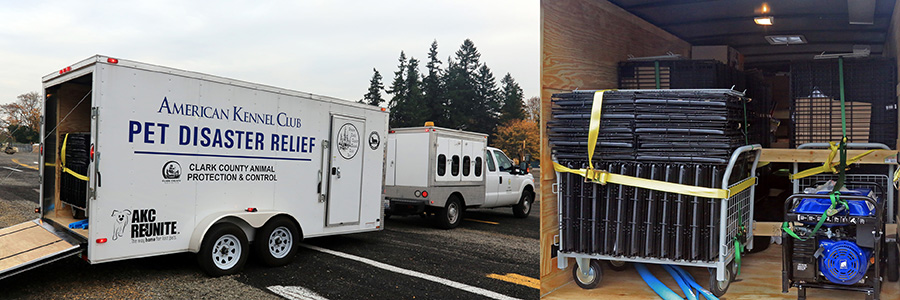Hurricanes, floods, wildfires, hazardous material spills — disasters can strike anytime, anywhere. To ensure the safety of your family and pets, you should decide a plan and make preparations for a number of events.
If you evacuate, take your pets
The most important thing you can do to protect your pets is take them with you when you evacuate. Animals left behind can easily be injured, lost or killed. Animals left inside your home can escape through storm-damaged areas, such as broken windows. Animals turned loose to fend for themselves are likely to become victims of exposure, starvation, predators, contaminated food or water or accidents. Leaving dogs tied or chained outside in a disaster is a death sentence.
- If you leave, even if you think you may be gone only for a few hours, take your animals. Once you leave, you have no way of knowing how long you'll be kept out of the area, and you may not be able to go back for your pets.
- Leave early — don't wait for a mandatory evacuation order. An unnecessary trip is far better than waiting too long to leave safely. If you wait to be evacuated by emergency officials, you might be told to leave your pets behind.
- Here is a disaster preparedness checklist for pets.
- Get information and tools on disaster preparedness for livestock.
Don't forget ID
Your pets should be wearing up-to-date identification at all times. Include the phone number of a friend or relative outside your immediate area. If your pet is lost, the number on the tag will be answered even if you're out of your home.
Find a safe place ahead of time
Because evacuation shelters generally don't accept pets (except for service animals), plan ahead to ensure your family and pets will have a safe place to stay. Don't wait until disaster strikes to do your research.
- Contact hotels and motels outside your immediate area to check policies about accepting pets. Ask about any restrictions on number, size and species. Ask if "no pet" policies would be waived in an emergency. Make a list of pet-friendly places and keep it handy. Call ahead for a reservation as soon as you think you might have to leave your home.
- Check with friends, relatives or others outside your immediate area. Ask if they would be able to shelter you and your animals or just your animals, if necessary. If you have more than one pet, you may have to be prepared to house them separately.
- Make a list of boarding facilities and veterinary offices that might be able to shelter animals in emergencies; include 24-hour telephone numbers.
- Ask your local animal shelter if it provides foster care or shelter for pets in an emergency. This should be your last resort, as shelters have limited resources and are likely to be stretched to their limits during an emergency.
If you don't evacuate
If your family and pets must wait out a storm or other disaster at home, identify a safe area of your home where you can all stay together.
- Keep dogs on leashes and cats in carriers, and make sure they are wearing identification.
- Have any medications and a supply of pet food and water inside watertight containers.
As the disaster approaches
Don't wait until the last minute to get ready. Warnings of hurricanes or other disasters may be issued hours, or even days, in advance.
- Call to confirm emergency shelter arrangements for your pets.
- Bring pets into the house and confine them so you can leave with them quickly if necessary. Make sure each pet and pet carrier has up-to-date identification and contact information. Include information about your temporary shelter location.
Make sure your disaster supplies are ready to go, including your pet disaster kit.
In case you're not home
An evacuation order may come, or a disaster may strike, when you're at work or out of the house.
Make arrangements well in advance for a trusted neighbor to take your pets and meet you at a specified location. Be sure the person is comfortable with your pets, knows where your animals are likely to be, knows where your disaster supplies are kept, and has a key to your home.
If you use a pet-sitting service, it may be able to help, but discuss the possibility well in advance.
Information courtesy of the Humane Society of the United States
